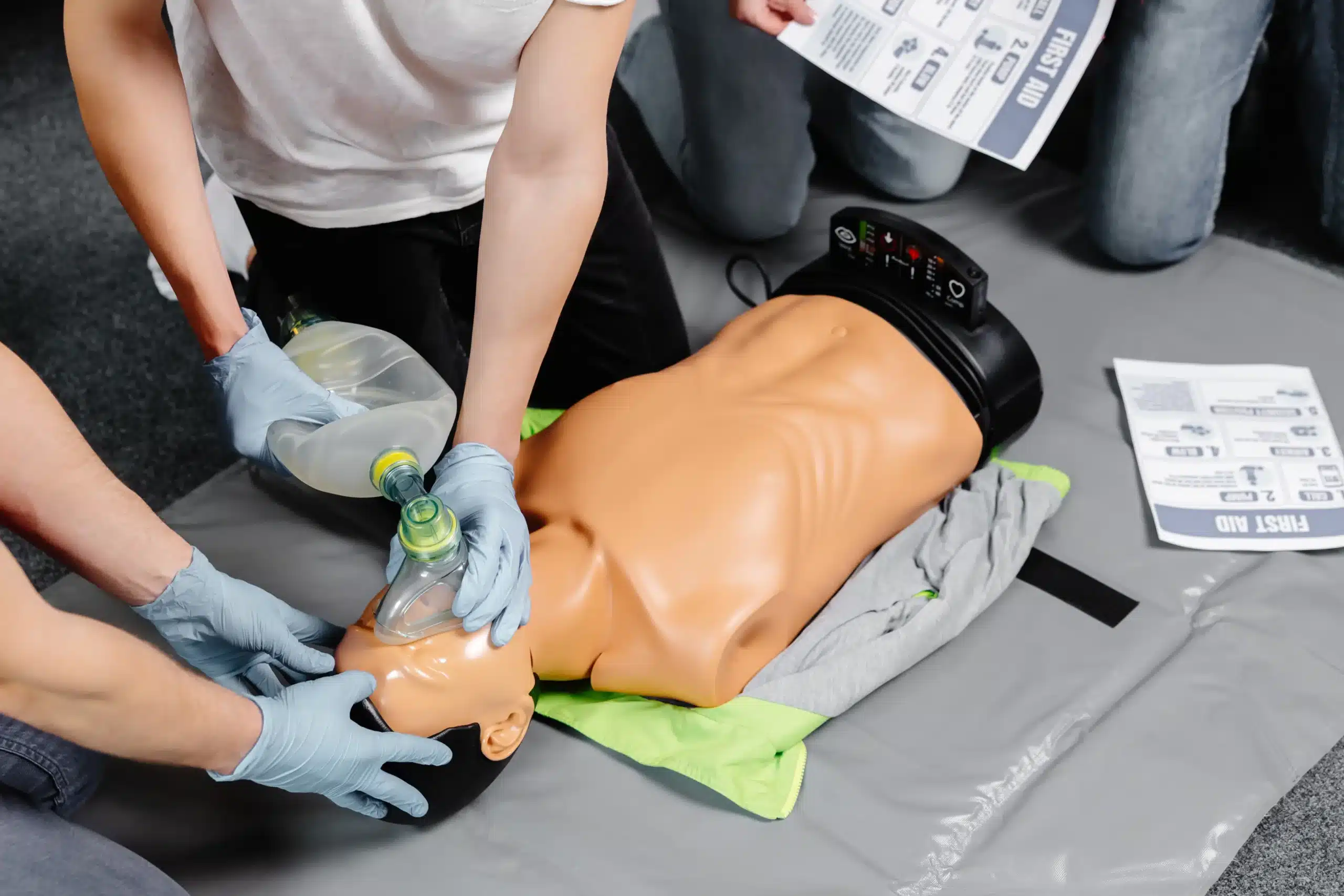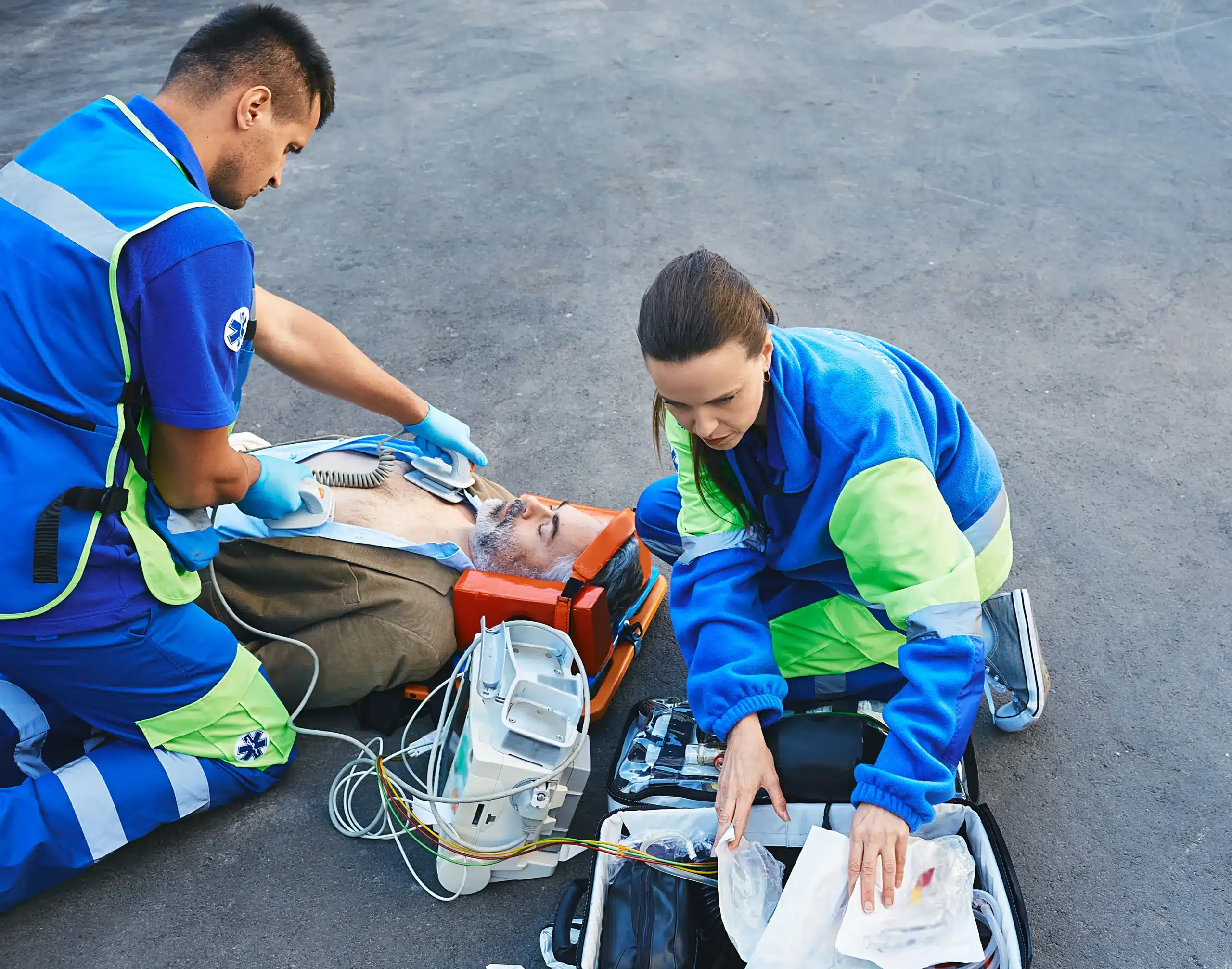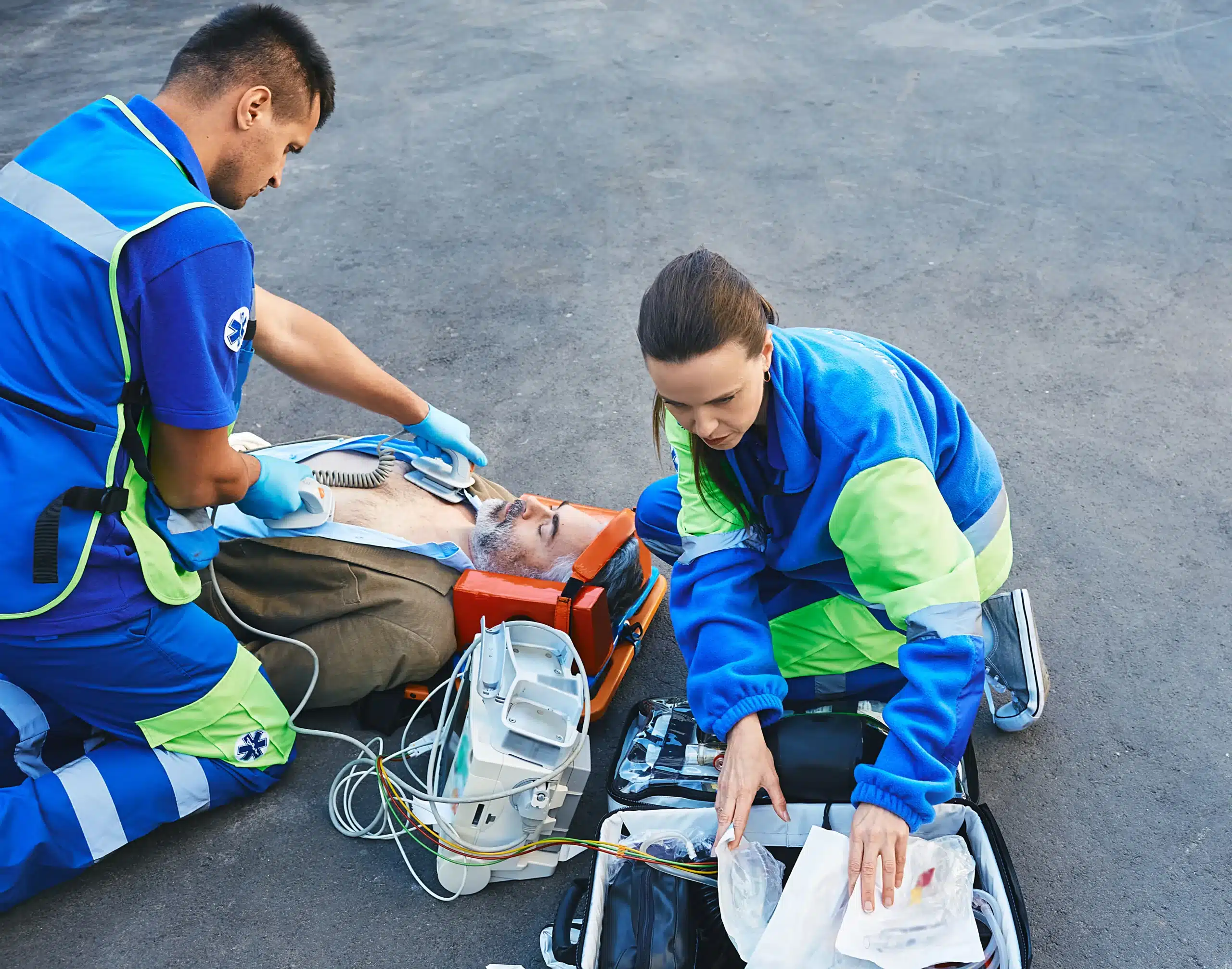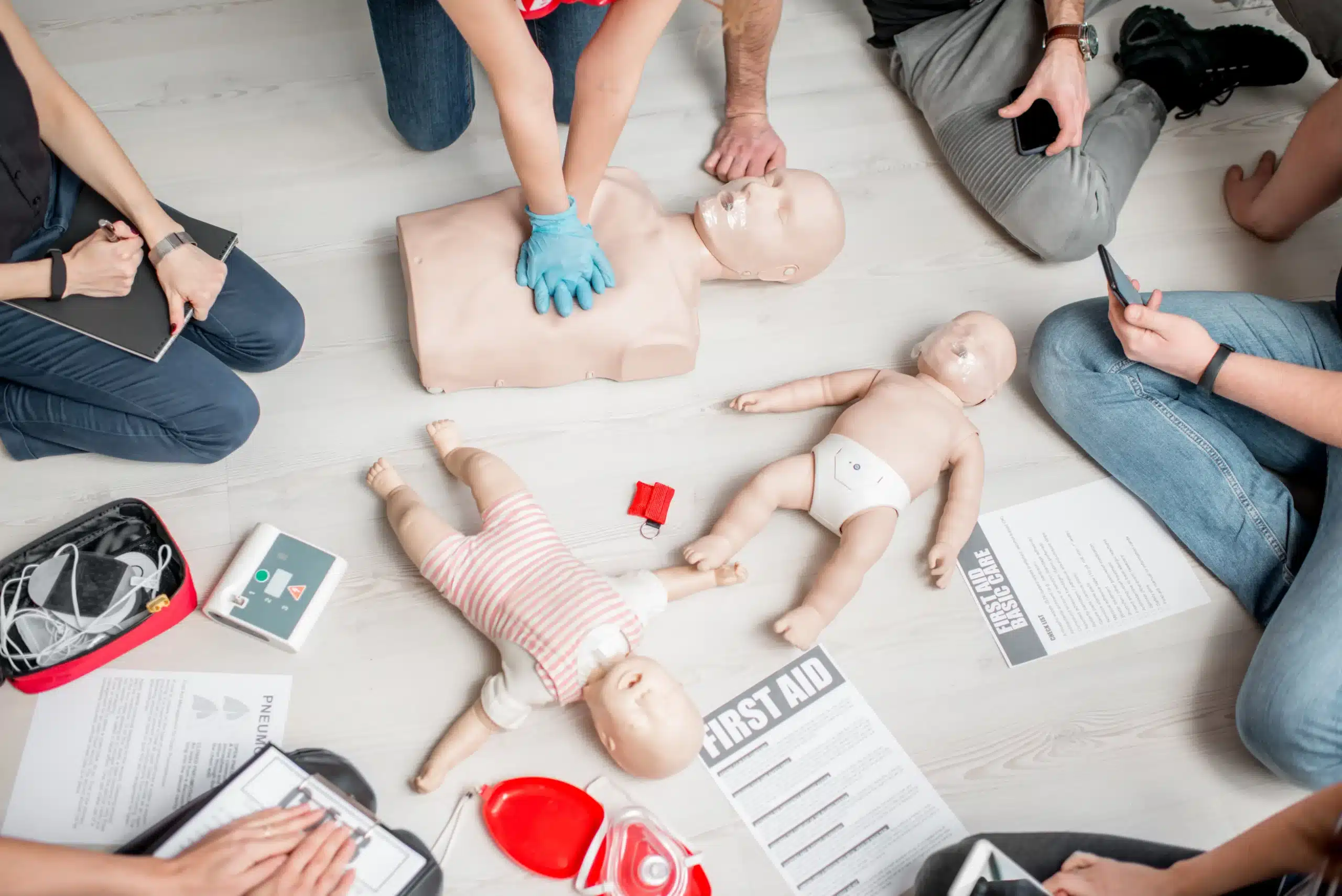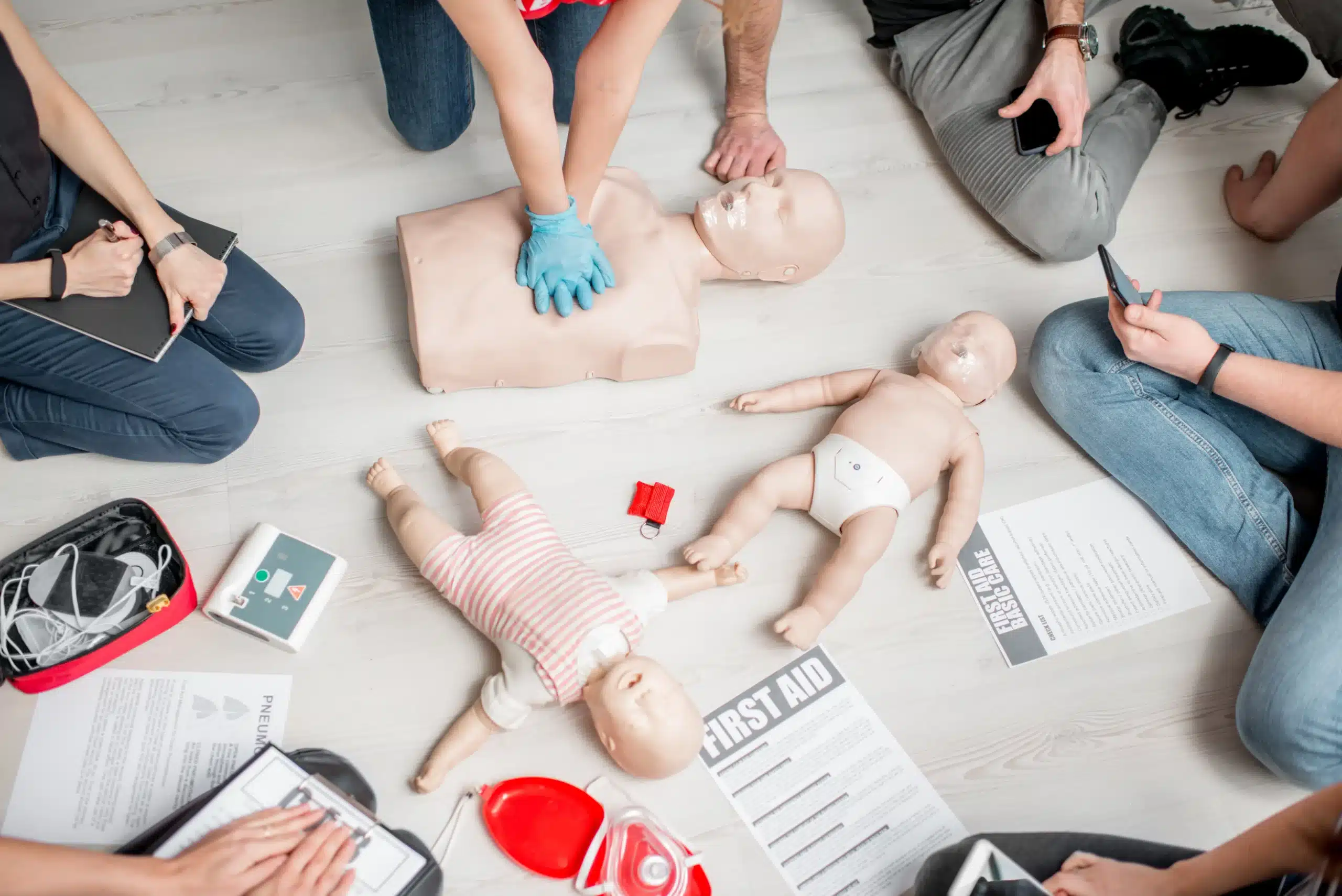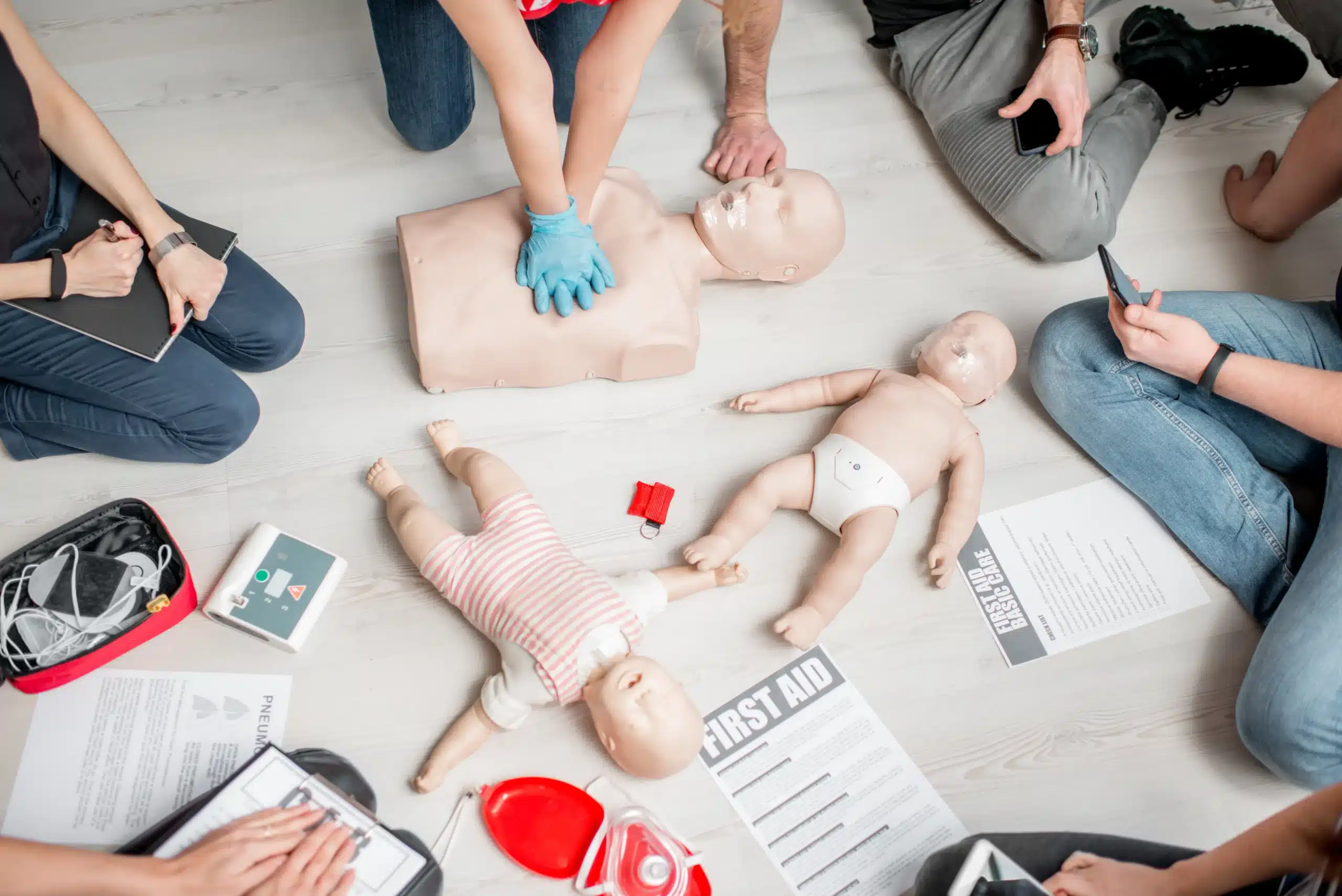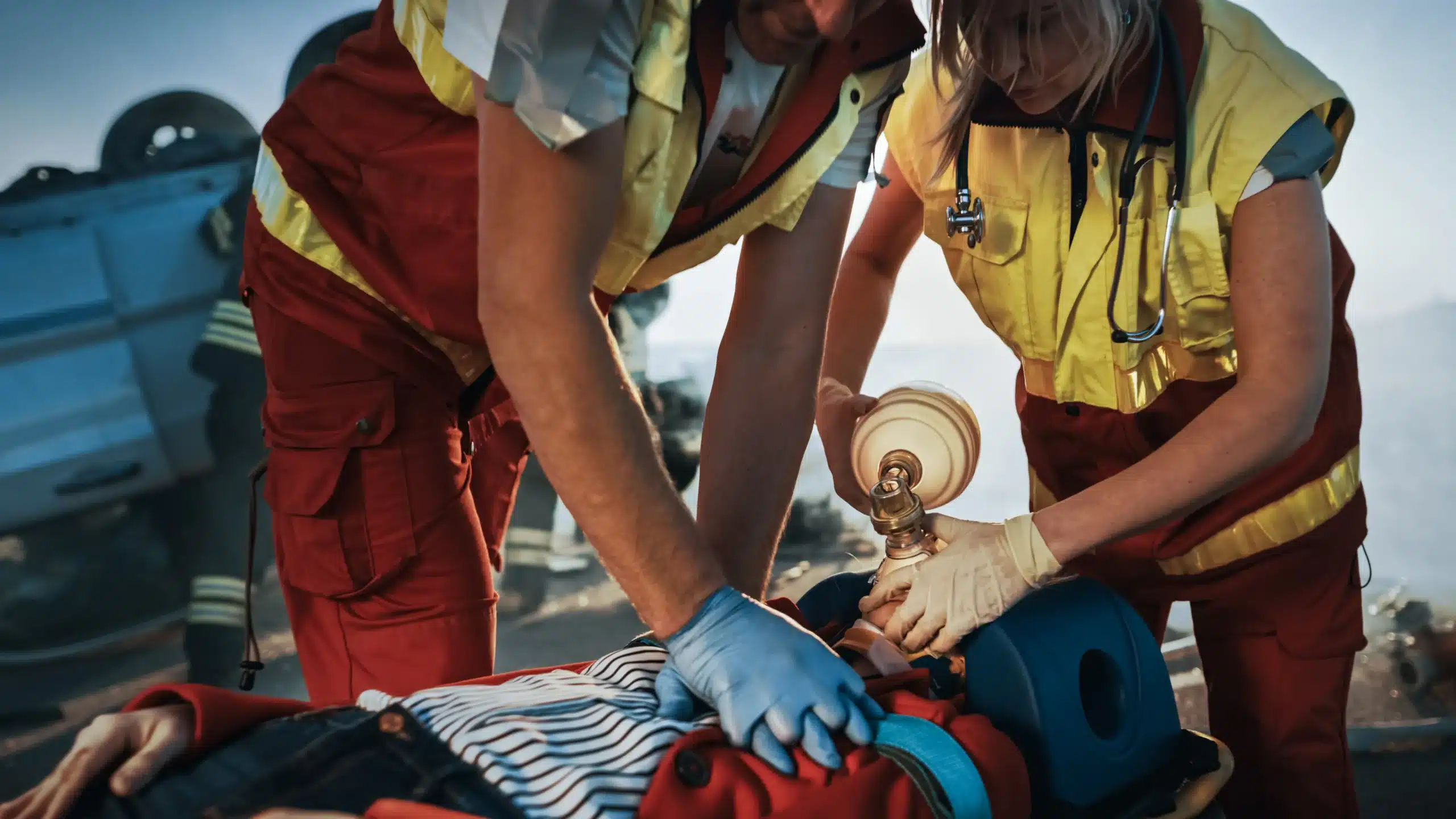Emergencies happen, and knowing first-aid can transform you from a bystander into a lifesaver. This comprehensive guide explores the world of first-aid in Concord, offering valuable insights into available training, certification options, and the benefits of becoming equipped to handle medical emergencies. We’ll cover various aspects of first-aid in Concord, from basic wound care to CPR and more advanced certifications like BLS and ACLS. Whether you’re looking to enhance your personal safety, advance your career, or contribute to a more prepared community, this guide will provide you with the information you need to get started with first-aid in Concord.
Key Takeaways
- First-aid training equips you with essential skills: Learn to respond effectively to various medical situations, from minor injuries to more serious emergencies. Choose a course that aligns with your specific needs and desired level of preparedness.
- Concord offers diverse first-aid and CPR training options: Explore courses like BLS, ACLS, and standard first aid, considering factors such as course content, format, and certification body. Select a program that fits your schedule and learning preferences.
- Maintain your skills through regular practice and renewal: Keep your first-aid knowledge current and your skills sharp by recertifying and pursuing continuing education opportunities. Consistent practice ensures you can confidently and effectively provide assistance when needed.
What is First-Aid Training in Concord?
First-aid training equips you with the skills to handle medical emergencies until professional help arrives. You’ll learn how to respond effectively to a range of situations, from minor cuts and burns to more serious injuries. These skills can make a real difference in critical moments. First-aid training programs often emphasize hands-on practice and repetition, building confidence so you can act quickly and efficiently under pressure. This practical approach helps you understand how to apply procedures in real-life scenarios. Many courses also cover teamwork and communication, vital in emergency response, especially when multiple people are involved. Effective communication during a medical crisis can streamline efforts and improve the outcome for the injured person. Beyond immediate response, first-aid training can increase safety awareness, potentially preventing accidents. This proactive approach can be particularly helpful in workplaces. First-aid training creates a safer environment for everyone. If you’re looking for first-aid training in Concord, you’ll find various courses designed for different needs. These certification courses aim to give you the knowledge and skills to provide immediate care in emergencies.
Available First-Aid Certification Courses
Knowing which first-aid course fits your needs is the first step. Let’s break down some common certifications available in Concord.
CPR Certification
CPR certification teaches you how to recognize and respond to cardiac arrest and other breathing emergencies. You’ll learn chest compressions, rescue breaths, and how to use an automated external defibrillator (AED). This training is crucial for anyone working in healthcare, childcare, or other fields where these emergencies might occur. Safety Training Seminars offers AHA-certified CPR training as part of their BLS course. This comprehensive approach ensures you gain practical skills and the confidence to act quickly.
Basic Life Support (BLS)
BLS certification builds upon CPR training, adding essential skills for healthcare providers. It covers team dynamics during resuscitation, advanced airway management, and high-quality CPR techniques. BLS certification is a requirement for many healthcare professionals and is a valuable asset for anyone wanting to be prepared for medical emergencies. Safety Training Seminars provides AHA-certified BLS training, equipping you with the knowledge and skills to provide effective care.
Advanced Cardiovascular Life Support (ACLS)
ACLS certification is designed for healthcare professionals who manage cardiopulmonary arrest and other cardiovascular emergencies. This advanced course covers topics like effective team communication, recognizing and treating strokes, and managing acute coronary syndromes. ACLS training often involves complex simulations and requires a solid foundation in BLS. Safety Training Seminars offers comprehensive ACLS courses that meet AHA guidelines.
Standard First Aid
Standard first-aid certification teaches you how to respond to a wide range of injuries and illnesses, from minor cuts and burns to more serious situations like fractures and allergic reactions. You’ll learn how to control bleeding, manage shock, and provide initial care until professional medical help arrives. This training is beneficial for anyone, regardless of profession, and empowers you to assist others in need. While Safety Training Seminars focuses primarily on CPR, BLS, and ACLS, you can find standard first-aid courses through organizations like the National Safety Council. They emphasize hands-on practice to build confidence in emergency situations.
Cost of First-Aid Training in Concord
Knowing the cost of first-aid training is a practical first step. Pricing varies depending on the course type and provider. Let’s break down the typical costs associated with different levels of first-aid and CPR training in Concord.
Price Ranges for Courses
For those seeking American Heart Association (AHA) compliant training, consider BLS courses covering the essentials of CPR and emergency cardiovascular care. These courses typically range in price, so check the provider’s website for the most up-to-date information. For non-medical professionals seeking CPR and AED certification, providers like In Home CPR offer ASHI-certified courses. Again, confirm current pricing directly with the provider. Those working in childcare should explore the EMSA Child Care Health & Safety course.
Discounts and Promotions
Smart shoppers look for deals. Many training centers, including Safety Training Seminars, frequently offer promotions. Check sites like Groupon for potential discounts on CPR and first-aid certification. Safety Training Seminars also has a low price guarantee, promising the best value for your training.
Group and Student Discounts
If you’re training with a group, or are a student, inquire about discounts. Group discounts can make training more accessible for workplaces, community groups, or families. Student discounts are sometimes available, making it more affordable to gain these valuable skills. Learning with friends or colleagues can also enhance the experience.
Find and Enroll in First-Aid Classes
Finding the right first-aid class in Concord is easier than you think. With various options, from traditional classrooms to online courses, you can find a program that fits your schedule and learning style. Let’s explore how to enroll in a first-aid class:
Training Centers and Facilities
Several established training centers in and around Concord offer comprehensive first-aid courses. Safety Training Seminars, for example, provides a streamlined approach to AHA-certified courses in BLS, ACLS, PALS, CPR, and First Aid, making it manageable for busy professionals. For hands-on training, consider the National Safety Council – New England Chapter, which emphasizes practical skills and repetition to build confidence in emergencies. In Home CPR offers classes at your home or workplace in Concord. This personalized approach can be especially convenient for groups or individuals with demanding schedules.
Online Enrollment
Online enrollment simplifies signing up for first-aid training. Many organizations, including the American Red Cross, offer online registration for their first-aid courses. This allows you to easily browse dates, compare options, and enroll from home. For a fast-tracked certification, the RQI program combines online learning with a skills test and same-day card issuance.
Community Resources
Beyond traditional training centers, explore community resources that may offer free or low-cost first-aid training. Joining a Community Emergency Response Team (CERT) often includes free CPR and first-aid certification. Additionally, check with your local or neighboring county’s Emergency Management Office, hospitals, the Red Cross, and community colleges for affordable courses. Local tips can sometimes be found on community forums like Reddit.
Duration and Format of First-Aid Courses
Choosing the right first-aid course often depends on factors like your learning style, schedule, and specific requirements. Let’s explore the different formats and time commitments.
In-Person Training
In-person first-aid training provides a hands-on learning experience ideal for people who learn best through direct interaction. You’ll work with instructors, receive immediate feedback, and ask questions in real-time. The emphasis on practical skills, such as practicing CPR on mannequins and bandaging techniques, builds confidence for real-life emergencies. Organizations like the National Safety Council offer comprehensive in-person training programs.
Online and Hybrid Options
If you need more flexibility, online and hybrid first-aid courses are a convenient alternative. Online training lets you learn at your own pace, fitting the coursework around your existing schedule. Hybrid courses combine online learning with in-person skills sessions for a blended approach. The American Red Cross offers online first-aid and CPR training. These options work well for busy individuals or those with limited access to traditional classroom settings.
Course Length and Time Commitment
First-aid course lengths vary based on the material covered and the certifying organization. Some courses may only last a few hours, while others require a more significant time investment. For example, some states, like New York, have specific training hour requirements for certification. Research the requirements based on your location and choose a course that fits your available time and desired certification level. Check with your employer or licensing board for any specific requirements they may have.
Benefits of First-Aid Certification
Knowing what to do in a medical emergency can make all the difference. Getting your first-aid certification offers significant benefits that extend beyond simply checking a box. It equips you with valuable skills and knowledge that can impact your life, career, and community.
Personal Safety and Empowerment
First-aid training empowers you to take action when it matters most. You’ll gain the confidence to respond effectively to a range of medical situations, from minor injuries like cuts and burns to more serious events like choking or a heart attack. This knowledge translates to increased personal safety for you and those around you. Learning these skills can boost your confidence in handling emergencies, knowing you have the tools to provide immediate assistance. This preparedness can bring peace of mind to your daily life. For more insights, check out this article on why first-aid training is so important: The Student Lawyer.
Career Advancement
A first-aid certification can open doors in your professional life. Many industries, especially those in healthcare, education, and public safety, view first-aid and CPR training as highly desirable qualifications. It signals to potential employers that you’re prepared to handle emergencies and prioritize safety, making you a more competitive candidate. This Quora discussion highlights the career advantages of holding a certification from a reputable organization like the Red Cross or American Heart Association. Additionally, first-aid training can contribute to a safer work environment, reducing accidents and improving overall productivity, as discussed in this Safety Line Lone Worker article.
Community Preparedness
First-aid training doesn’t just benefit you individually; it strengthens your community as a whole. When more people are equipped with first-aid skills, the community becomes more resilient in the face of emergencies. These skills promote teamwork and leadership, as effective responses often require clear communication and coordinated efforts. This piece from CPR Care emphasizes the role of first-aid training in developing these essential community skills. By becoming certified, you contribute to a network of prepared individuals ready to assist in times of need.
Choose the Right First-Aid Course
Finding the right first-aid course is crucial for effective emergency preparedness. Whether you’re a parent, teacher, healthcare worker, or simply someone who wants to be prepared, selecting the appropriate training can make all the difference. Here’s a breakdown of how to choose the best fit:
Assess Your Needs
Before searching for courses, consider your specific needs. Are you looking for basic first-aid knowledge for everyday situations? Or do you require more advanced training for a specific professional role, like a healthcare provider? Think about the environments you’re most likely to encounter. Childcare providers, for instance, might need training that covers common childhood injuries, while those working in construction may require specialized first-aid protocols. Understanding your specific requirements will help you narrow your options. For specific certifications like Basic Life Support, check out our BLS certification page.
Compare Course Offerings
Once you have a clearer picture of your needs, compare different course offerings. Look at the curriculum and ensure it aligns with your goals. Hands-on practice is essential for developing confidence and competence in first aid, so prioritize courses that emphasize practical skills. Check if the course includes CPR and AED training, as these are valuable additions to any first-aid certification. Also, consider the format. Do you prefer in-person instruction, or would online or blended learning work better? In-home CPR training is also an option for those seeking more personalized instruction. For those in or near Concord, consider checking out CPR classes in Concord.
Certification Requirements
Finally, pay attention to the certification requirements. Ensure the course you choose is accredited by a reputable organization like the American Heart Association or the American Red Cross. These certifications are widely recognized and demonstrate a commitment to high-quality training. Check the duration of the certification and any renewal requirements. Understanding these details will help you maintain your certification and stay current with first-aid practices.
Prepare for Your First-Aid Training
Getting ready for your first-aid training is straightforward, but a little preparation goes a long way. Knowing what to expect and having the necessary materials will help you focus on learning these lifesaving skills.
Prerequisites and Materials
Most first-aid courses, including those leading to ASHI certification through providers like In Home CPR, don’t require formal prerequisites for non-medical professionals. This makes training accessible to almost anyone. Check with your chosen provider to confirm any specific requirements. While materials are usually provided, bringing a notebook and pen for note-taking is always a good idea. Comfortable clothing is also recommended for the hands-on portions of the class.
What to Expect
First-aid training equips you with the skills and confidence to handle various emergencies. Expect a mix of instruction and hands-on practice, covering assessing injuries, controlling bleeding, managing fractures, and providing CPR. Many courses, like those from the National Safety Council, use repetition and practical exercises to build confidence, ensuring you can apply your skills under pressure. Beyond practical skills, first-aid training teaches valuable soft skills like clear communication and teamwork—essential for coordinating responses in real-life emergencies. This training prepares you to help others and fosters a safer environment, making it a worthwhile investment. The ability to provide assistance and potentially save a life is truly empowering.
Maintain Your First-Aid Certification
Keeping your first-aid skills sharp is crucial for responding effectively in emergencies. This section covers how to maintain your certification and continue learning.
Renewal Requirements
First-aid certifications, like those from the American Heart Association, are typically valid for two years. Regular renewal ensures you’re current on the latest first-aid practices and guidelines, which can change as medical knowledge evolves. The Red Cross also follows this two-year renewal cycle for their in-person first-aid training. Check your certification card for the exact expiration date and recertify before it lapses.
Continuing Education
Even if your certification isn’t expiring soon, continued learning is key to improving your skills. Think of it like any other skill – practice makes you more proficient. Look for opportunities to refresh your knowledge through workshops, online resources, or refresher courses. A good first-aid training program incorporates hands-on practice and an updated curriculum. This ongoing education not only strengthens your individual skills but also contributes to a safer environment, whether at home or in the workplace. By regularly engaging with first-aid principles, you become more aware of potential hazards and better equipped to prevent accidents.
First-Aid Training Providers in Concord
Finding the right first-aid training provider is crucial for receiving quality instruction and a recognized certification. Concord offers several options, each with its own advantages. Here’s a closer look at some providers in the area:
Safety Training Seminars
Safety Training Seminars offers American Heart Association (AHA) certified courses in BLS, ACLS, PALS, CPR, and First Aid. Their streamlined approach and convenient location in nearby Walnut Creek make learning these vital skills manageable for busy professionals serving the Concord community. They also offer a low-price guarantee.
CPR Training Center
CPR Training Center offers affordable CPR certification and renewal courses that align with American Heart Association standards. They provide AHA-certified ACLS, PALS, and BLS for Healthcare Providers, plus First Aid and CPR training for individuals in Brentwood, Walnut Creek, San Ramon, Concord, and Pleasant Hill.
CPRedu
CPRedu offers CPR classes and certification in Concord and surrounding areas. With various class locations throughout Concord—including Stanwell Drive, downtown near Todos Santos Plaza, Sunvalley Shopping Center, and Monument Blvd near Costco—CPRedu makes finding a convenient class easy.
In Home CPR
In Home CPR brings First Aid, CPR, and BLS certification classes directly to Concord homes and businesses. Serving the Concord community since 2010, their CPR and AED certification is an ASHI two-year certification designed for non-medical professionals.
American Red Cross
The American Red Cross provides first-aid training courses that equip people with the skills to handle various emergencies. Their training covers common emergencies, from minor injuries like burns to more serious situations, such as heart attacks.
National Safety Council
The National Safety Council offers First Aid, CPR, and AED training. Their focus on hands-on practice and repetition helps participants build confidence for real-life emergencies.
Related Articles
- First Aid Certification Walnut Creek: Your Guide – Walnut Creek CPR Classes
- CPR & First Aid Classes in Concord: Your Guide – Walnut Creek CPR Classes
- BLS Courses in Concord: Find the Right Class for You – Walnut Creek CPR Classes
- Advanced Cardiac Life Support (ACLS) in Concord, CA – Walnut Creek CPR Classes
- American Heart Association (AHA) Courses in Concord – Walnut Creek CPR Classes
Frequently Asked Questions
What’s the difference between CPR and First Aid? CPR focuses specifically on life-threatening breathing and cardiac emergencies, teaching you how to perform chest compressions, rescue breaths, and use an AED. First Aid covers a broader range of injuries and illnesses, from minor cuts and burns to more serious situations like fractures and allergic reactions. Think of CPR as a specialized skill within the wider scope of first-aid knowledge.
How do I choose the right first-aid course in Concord? Consider your specific needs and the situations you’re most likely to encounter. If you’re a healthcare provider, BLS or ACLS certification might be necessary. For general knowledge or workplace requirements, standard first aid and CPR training is a good starting point. Look at course content, format (online, in-person, or hybrid), and the certifying organization’s reputation before deciding.
How much does first-aid training cost in Concord? Costs vary depending on the course type, provider, and any included certifications (like CPR or AED). Check directly with training providers like Safety Training Seminars or the American Red Cross for current pricing. Look for potential discounts, such as group or student rates, which can make training more affordable.
How long are most first-aid certifications valid? Most first-aid certifications, including those from the American Heart Association and the Red Cross, are valid for two years. It’s essential to renew your certification before it expires to stay current with the latest guidelines and maintain your skills.
What if I have a busy schedule? Can I still get certified? Absolutely! Many providers offer flexible learning options, including online and hybrid courses, to fit around busy schedules. Online training allows you to learn at your own pace, while hybrid courses combine online learning with in-person skills sessions. Some providers even offer in-home training for added convenience.
